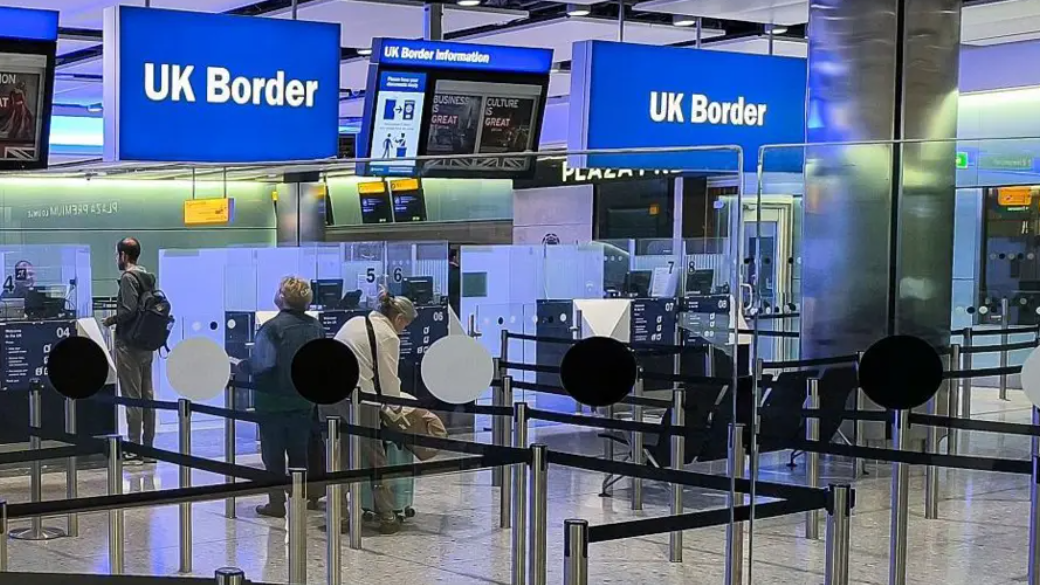Carer says visa changes are 'tearing' families apart

Carer Lyn Muchegwa is on a five-year visa sponsored by a UK company licensed by the Home Office
- Published
A lack of clarity about changes to the right to live and work indefinitely in the UK is "tearing" migrant workers apart, one carer has said.
Lyn Muchegwa, 36, moved to Cheltenham, Gloucestershire from Zimbabwe with her family in February 2023 on a five-year visa sponsored by a care company.
She planned to apply for settled status when the mandatory five-year waiting period was up. However, government proposals could see that period doubled - meaning Ms Muchegwa would have to stay at the firm for 10 years.
A Home Office spokesperson said it would consult on the proposals later this year and provide details about "transitional arrangements for people already in the UK".
To apply for a temporary visa, candidates must first obtain a Certificate of Sponsorship (CoS). They are then obliged to remain with the same sponsor for the duration of the visa.
Currently, most migrants who come to the UK on time-limited work visas can apply for indefinite leave to remain after five years.
The government has set out a wide package of measures to cut legal immigration, which included a requirement for migrants to typically live in the UK for 10 years before applying for the right to remain.
"It's really concerning because you are just stuck in one place, with one employer, and not able to explore other sectors because your visa is limiting you to certain things," Ms Muchegwa said.

The government is considering changing the rules on permanent settlement for care workers from overseas
Former teacher of immigration law Kim Edmonds said many migrant workers accepted jobs with sponsors but planned to move on once they had settled status.
"Then you're told, 'by the way, the government is proposing to double the time to 10 years'," Ms Edmonds said.
She added some workers have to travel to clients by bus, including in the middle of the night, because they are unable to drive.
She also claimed some sponsored employees faced "appalling" working conditions.
"I've heard of some working fundamentally terrible hours and no paid travel time between clients," she said.
"Payment is frequently delayed and there are extractions for all kinds of bits and pieces, which can mean they're working on well below the minimum wage."
She said workers are reluctant to complain out of fear their sponsorship will not be renewed.
Ms Muchegwa, who has a 10-year old daughter and a 19-year-old son living with her in the UK, said her dream was one day to manage her own care service, but that was now on hold.
"The 10-year wait is a long wait and you have limited time to do your education, so it's really hard," she said.
Ms Muchegwa has said she feels lucky because her sponsor, Merit Care, is a good employer - but she is locked into working for them until she secures settled status.
"We don't know where we stand and what the outcome will be," she said. "It's not a stable environment so it's stressing us out.
"It's tearing us apart because you don't spend time with your children.
"It really affects the family as my children, they're growing, and you don't have time with them."
Merit Care was approached for comment.
Mary is a live-in carer in Gloucestershire who moved to the UK from Zimbabwe several years ago and now supports other migrant workers by paying for their driving lessons.
She claimed that despite companies being licensed by the Home Office, many foreign workers are being "exploited" by their sponsors.
"Some of the employers, they are not treating them right, so the workers want to get out as soon as possible," she said.
"But the companies don't care and they say, 'If you don't do it, you're out of this, I'll take your CoS'. Everyone is afraid of losing their CoS.
"It's like being suffocated; they're being exploited; they're ready to explode."
CEO of Care Workers' Charity Karolina Gerlich said changing the rules part way through people's existing visa periods "undermines trust and stability".
Members of the charity's Care Worker Advisory Board and Champions Project warned the move "could increase exploitation" and create a sense of "betrayal".
"It makes people feel unwanted, and many may look to countries where their work is more valued," said a spokesperson.
"It adds real financial and emotional strain and some families are already struggling to stay together under the pressure."
According to the latest government figures, Health and Care visas were issued to 160,601 people in caring and personal services roles from the start of 2021 to the end of June 2025.
A Home Office spokesperson said there had been "significant concerns over abuse and exploitation of care workers from overseas", with overseas recruitment for Adult Social Care ending on 22 July as a result.
It added it was working with local authorities and other organisations to share intelligence about illegal or unethical practices in adult social care.
Get in touch
Tell us which stories we should cover in Gloucestershire
Follow BBC Gloucestershire on Facebook, external, X, external and Instagram, external. Send your story ideas to us on email or via WhatsApp on 0800 313 4630.
Related topics
- Published18 December 2023

- Published5 December 2023

- Published16 April
